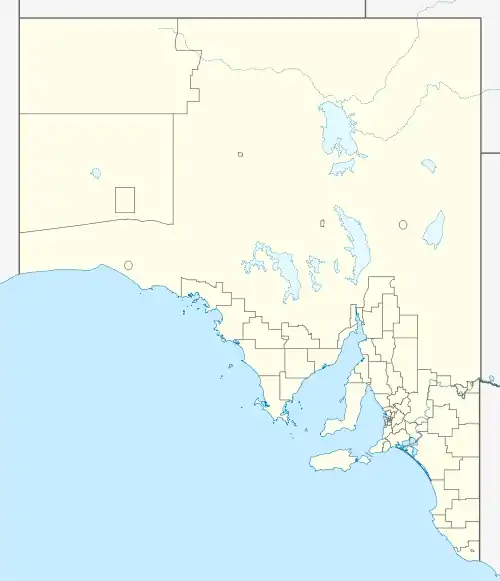Cape Donington
Cape Donington is a headland in the Australian state of South Australia located at the most northerly part of the Jussieu Peninsula on the east coast of Eyre Peninsula in about 10 kilometres (6.2 miles) east of the city of Port Lincoln.[1][2]
| Cape Donington South Australia | |
|---|---|
 Cape Donington | |
| Coordinates | 34°44′S 136°0′E |
| Location | 10 km (6 mi) east of Port Lincoln |
It is the southern entrance point for the natural harbour known as Port Lincoln. The cape is described by one source as being "the N[orth] extremity of a peninsula which extends 4 nautical miles (7.4 kilometres; 4.6 miles) N[orth] from the coast", that "this extension forms the E[ast] side of Spalding Cove" and that "about 0.5 nautical miles (0.93 kilometres; 0.58 miles) S[outh] W[est] of the cape, the land rises to a wooded summit, 53 metres (174 feet) high."[3][2]
It was named by the Royal Navy officer, Matthew Flinders, on 25 February 1802 reportedly after "his native village in Lincolnshire". The land around Cape Donington was first used for agricultural purposes in 1875. A navigation aid consisting of a light was installed in 1905 and was subsequently replaced by a lighthouse.[4][5][6][7]
After 1972, the land was added to the Lincoln National Park with a parcel of land sized at 4 hectares (9.9 acres) being leased to the Australian Maritime Safety Authority for the purpose of operating the lighthouse.[7]
See also
References
- Royal Australian Navy Hydrographic Service Hydrographic Department (1983). Port Lincoln and approaches (chart no. Aus 134).
- Boating Industry Association of South Australia (BIA); South Australia. Department for Environment and Heritage (2005), South Australia's waters an atlas & guide, Boating Industry Association of South Australia, p. 215, ISBN 978-1-86254-680-6
- Sailing Directions (Enroute), Pub. 175: North, West, and South Coasts of Australia (PDF). Sailing Directions. United States National Geospatial-Intelligence Agency. 2017. p. 186.
- "Donington, Cape". State Library of South Australia. Archived from the original on 4 December 2014. Retrieved 27 November 2014.
- Flinders, Matthew (1966) [1814]. A Voyage to Terra Australis : undertaken for the purpose of completing the discovery of that vast country, and prosecuted in the years 1801, 1802, and 1803 in His Majesty's ship the Investigator, and subsequently in the armed vessel Porpoise and Cumberland Schooner; with an account of the shipwreck of the Porpoise, arrival of the Cumberland at Mauritius, and imprisonment of the commander during six years and a half in that island (Facsimile ed.). Adelaide; Facsimile reprint of: London : G. and W. Nicol, 1814 ed. In two volumes, with an Atlas (3 volumes): Libraries Board of South Australia. p. 233. Retrieved 9 March 2013.CS1 maint: location (link)
- Parsons, Ronald (1985), Lighthouses of South Australia, R. Parsons, p. 15, ISBN 978-0-909418-35-9
- "Lincoln National Park Management Plan". Department of Environment Water and Natural Resources. 2004. pp. 7, 26 & 36. Retrieved 26 January 2014.
